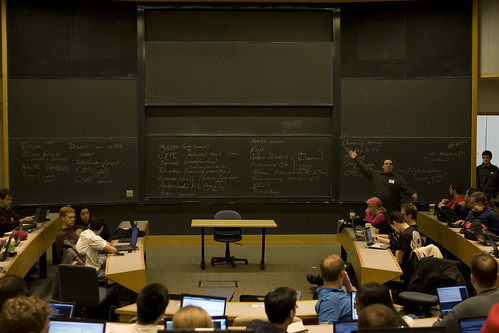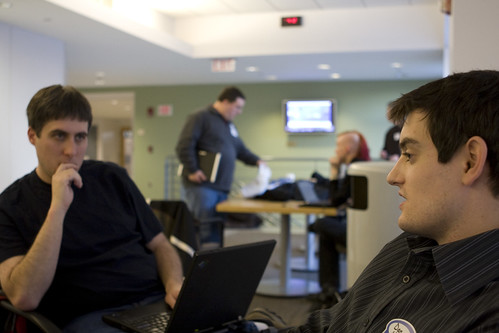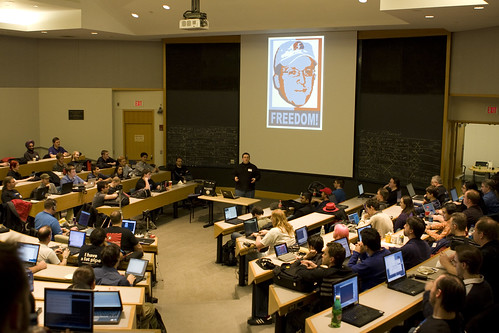 DebConf20 starts in about 5 weeks
DebConf20 starts in about 5 weeks, and as always, the DebConf
Videoteam is working hard to make sure it'll be a success. As such, we held a
sprint from July 9th to 13th to work on our new infrastructure.
A remote sprint certainly ain't as fun as an in-person one, but we nonetheless
managed to enjoy ourselves. Many thanks to those who participated, namely:
- Carl Karsten (CarlFK)
- Ivo De Decker (ivodd)
- Kyle Robbertze (paddatrapper)
- Louis-Philippe V ronneau (pollo)
- Nattie Mayer-Hutchings (nattie)
- Nicolas Dandrimont (olasd)
- Stefano Rivera (tumbleweed)
- Wouter Verhelst (wouter)
We also wish to extend our thanks to Thomas Goirand and
Infomaniak for
providing us with virtual machines to experiment on and host the video
infrastructure for DebConf20.
Advice for presenters
For DebConf20, we strongly encourage presenters to record their talks in
advance and send us the resulting video. We understand this is more work,
but we think it'll make for a more agreeable conference for everyone. Video
conferencing is still pretty wonky and there is nothing worse than a talk
ruined by a flaky internet connection or hardware failures.
As such, if you are giving a talk at DebConf this year, we are asking you to
read and follow our guide on
how to record your presentation.
Fear not: we are not getting rid of the Q&A period at the end of talks.
Attendees will ask their questions either on IRC or on a collaborative pad
and the Talkmeister will relay them to the speaker once the pre-recorded
video has finished playing.
New infrastructure, who dis?
Organising a virtual DebConf implies migrating from our battle-tested
on-premise workflow to a completely new remote one.
One of the major changes this means for us is the addition of Jitsi Meet to our
infrastructure. We normally have 3 different video sources in a room: two
cameras and a slides grabber. With the new online workflow, directors will be
able to play pre-recorded videos as a source, will get a feed from a Jitsi room
and will see the audience questions as a third source.
This might seem simple at first, but is in fact a very major change to our
workflow and required a lot of work to implement.
== On-premise == == Online ==
Camera 1 Jitsi
v ---> Frontend v ---> Frontend
Slides -> Voctomix -> Backend -+--> Frontend Questions -> Voctomix -> Backend -+--> Frontend
^ ---> Frontend ^ ---> Frontend
Camera 2 Pre-recorded video
In our tests, playing back pre-recorded videos to voctomix worked well, but was
sometimes unreliable due to inconsistent encoding settings. Presenters will
thus upload their pre-recorded talks to
SReview so we can make sure there
aren't any obvious errors. Videos will then be re-encoded to ensure a
consistent encoding and to normalise audio levels.
This process will also let us stitch the Q&As at the end of the pre-recorded
videos more easily prior to publication.
Reducing the stream latency
One of the pitfalls of the streaming infrastructure we have been using since
2016 is high video latency. In a worst case scenario, remote attendees could
get up to 45 seconds of latency, making participation in events like BoFs
arduous.
In preparation for DebConf20, we added a new way to stream our talks: RTMP.
Attendees will thus have the option of using either an HLS stream with higher
latency or an RTMP stream with lower latency.
Here is a comparative table that can help you decide between the two protocols:
| Pros |
- Can be watched from a browser
- Auto-selects a stream encoding
- Single URL to remember
|
|
| Cons |
- Higher latency (up to 45s)
|
- Requires a dedicated video player (VLC, mpv)
- Specific URLs for each encoding setting
|
Live mixing from home with VoctoWeb
Since DebConf16, we have been using
voctomix, a live video mixer developed
by the CCC VOC. voctomix is conveniently divided in two: voctocore is the
backend server while voctogui is a GTK+ UI frontend directors can use to
live-mix.
Although voctogui can connect to a remote server, it was primarily designed to
run either on the same machine as voctocore or on the same LAN. Trying to use
voctogui from a machine at home to connect to a voctocore running in a
datacenter proved unreliable, especially for high-latency and low bandwidth
connections.
Inspired by the setup FOSDEM uses, we instead decided to go with a web frontend
for voctocore. We initially used
FOSDEM's code as a proof of
concept, but quickly reimplemented it in Python, a language we are more
familiar with as a team.
Compared to the FOSDEM PHP implementation, voctoweb implements A / B source
selection (akin to voctogui) as well as audio control, two very useful
features. In the following screen captures, you can see the old PHP UI on the
left and the new shiny Python one on the right.

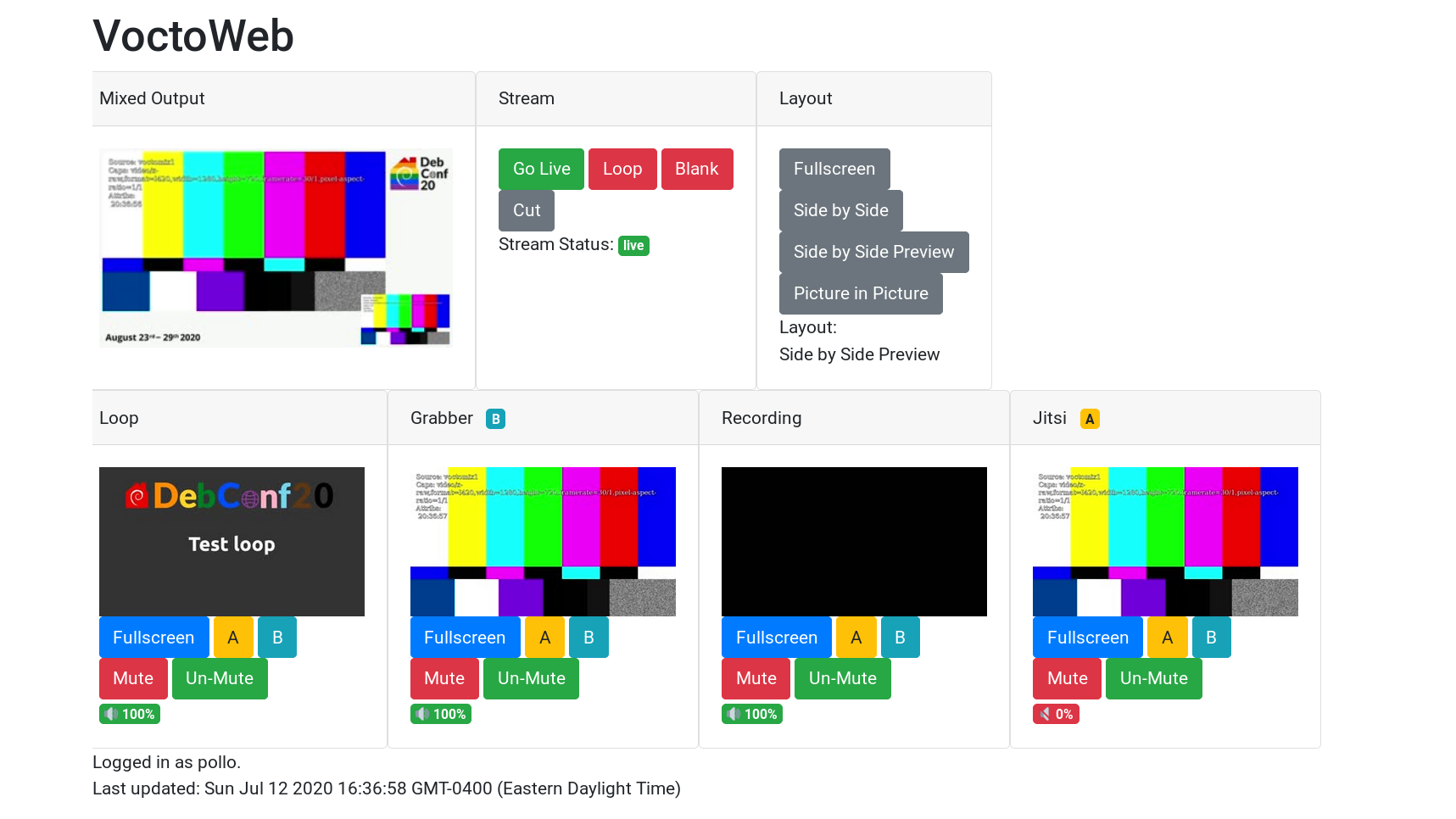 Voctoweb
Voctoweb is still under development and is likely to change quite a bit
until DebConf20. Still, the current version seems to works well enough to be
used in production if you ever need to.
Python GeoIP redirector
We run multiple geographically-distributed streaming frontend servers to
minimize the load on our streaming backend and to reduce overall latency.
Although users can connect to the frontends directly, we typically point them
to
live.debconf.org and redirect connections to the nearest server.
Sadly,
6 months ago MaxMind decided to change the licence on their
GeoLite2 database and left us scrambling. To fix this annoying issue, Stefano
Rivera wrote a Python program that uses the new database and reworked
our
ansible frontend server role. Since the new database cannot be
redistributed freely, you'll have to get a (free) license key from MaxMind if
you to use this role.
Ansible & CI improvements
Infrastructure as code is a living process and needs constant care to fix bugs,
follow changes in DSL and to implement new features. All that to say a large
part of the sprint was spent making our ansible roles and continuous
integration setup more reliable, less buggy and more featureful.
All in all, we merged 26 separate ansible-related merge request during the
sprint! As always, if you are good with ansible and wish to help, we accept
merge requests on our
ansible repository :)
 The Debian Videoteam has been
sprinting in
Cape Town, South Africa -- mostly because with Stefano here for a few
months, four of us (Jonathan, Kyle, Stefano, and myself) actually are in
the country on a regular basis. In addition to that, two more members of
the team (Nicolas and Louis-Philippe) are joining the sprint remotely
(from Paris and Montreal).
The Debian Videoteam has been
sprinting in
Cape Town, South Africa -- mostly because with Stefano here for a few
months, four of us (Jonathan, Kyle, Stefano, and myself) actually are in
the country on a regular basis. In addition to that, two more members of
the team (Nicolas and Louis-Philippe) are joining the sprint remotely
(from Paris and Montreal).
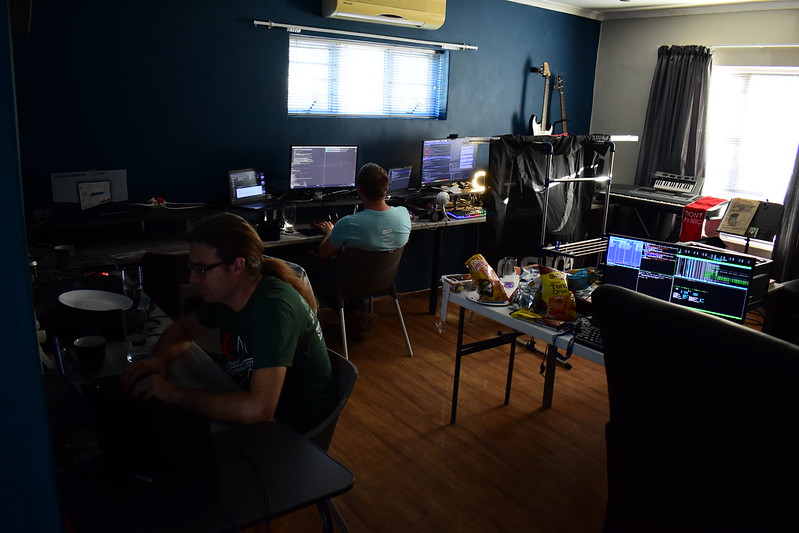 (Kyle and Stefano working on things, with me behind the camera and
Jonathan busy elsewhere.)
We've made loads of
progress!
Some highlights:
(Kyle and Stefano working on things, with me behind the camera and
Jonathan busy elsewhere.)
We've made loads of
progress!
Some highlights:




 Wouter s tasks
Wouter s tasks Wouter s props, needed to complete his tasks
Wouter s props, needed to complete his tasks Bike tour leg at Cape Town Stadium.
Bike tour leg at Cape Town Stadium. Seeking out 29 year olds.
Seeking out 29 year olds. Wouter finishing his lemon and actually seemingly enjoying it.
Wouter finishing his lemon and actually seemingly enjoying it.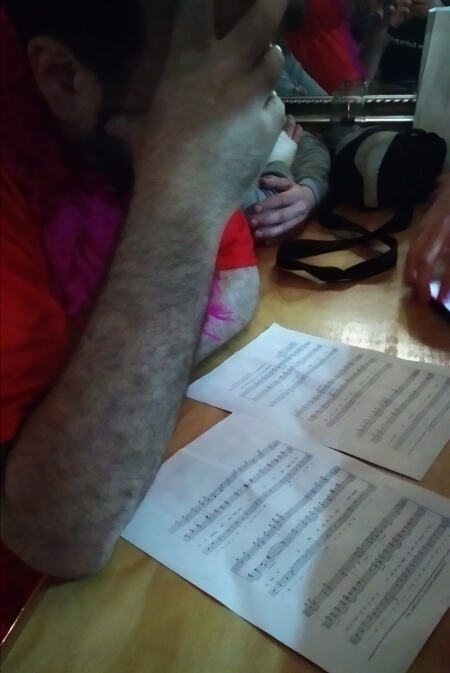 Reciting South African national anthem notes and lyrics.
Reciting South African national anthem notes and lyrics. The national anthem, as performed by Wouter (I was actually impressed by how good his pitch was).
The national anthem, as performed by Wouter (I was actually impressed by how good his pitch was).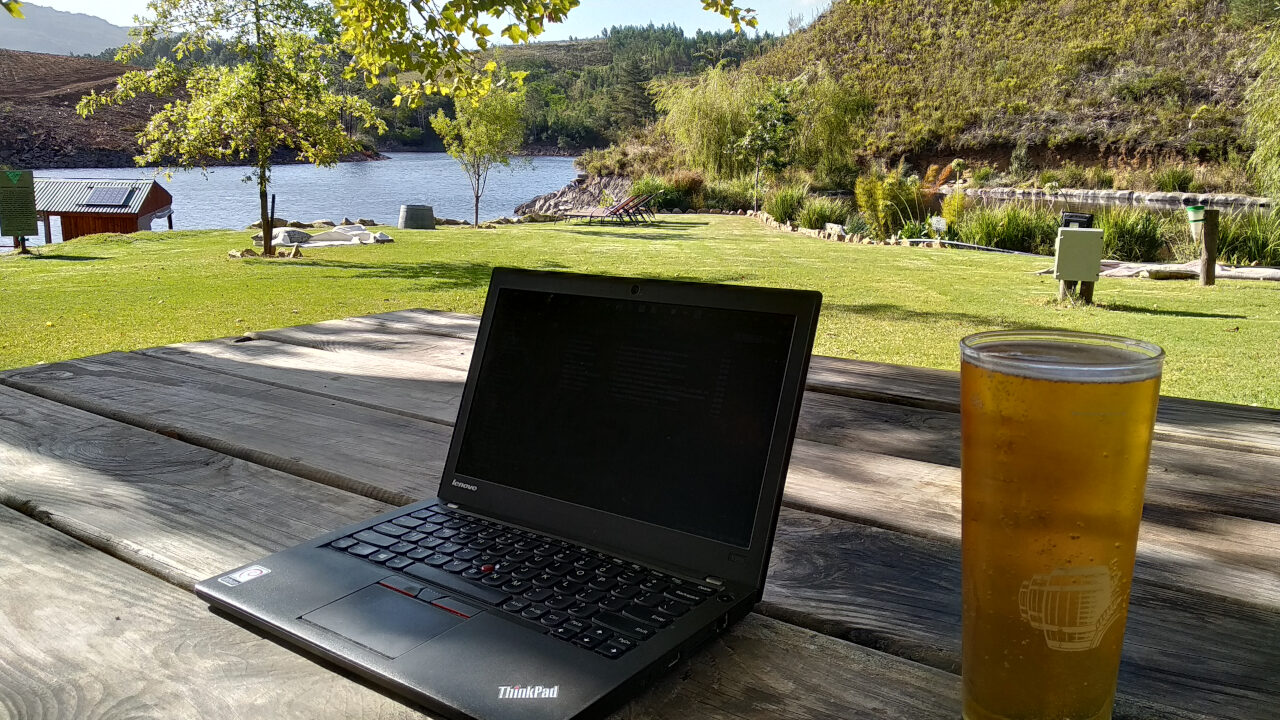
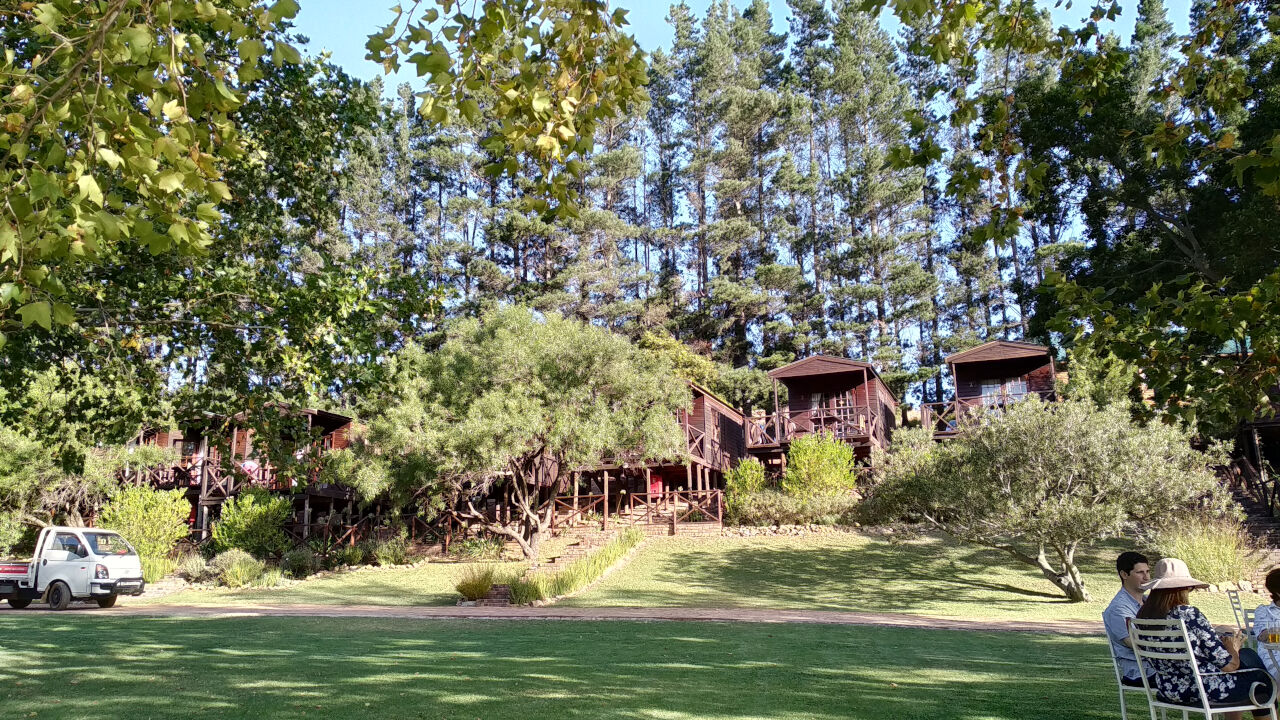 Accommodation at the lodge
Accommodation at the lodge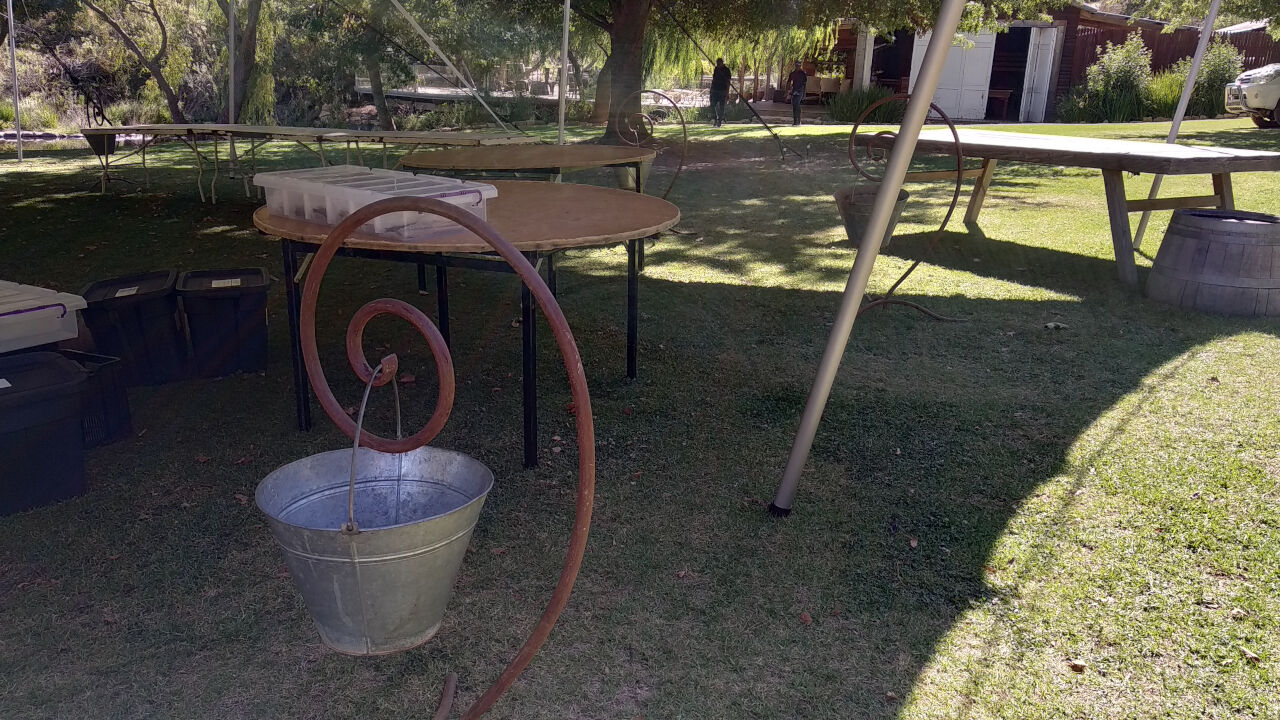 Debian swirls everywhere
Debian swirls everywhere I took a canoe ride on the river and look what I found, a paddatrapper!
I took a canoe ride on the river and look what I found, a paddatrapper!


 A bit of digital zoomage of previous image.
A bit of digital zoomage of previous image. Time to say the vows.
Time to say the vows. Just married. Thanks to Sue Fuller-Good for the photo.
Just married. Thanks to Sue Fuller-Good for the photo.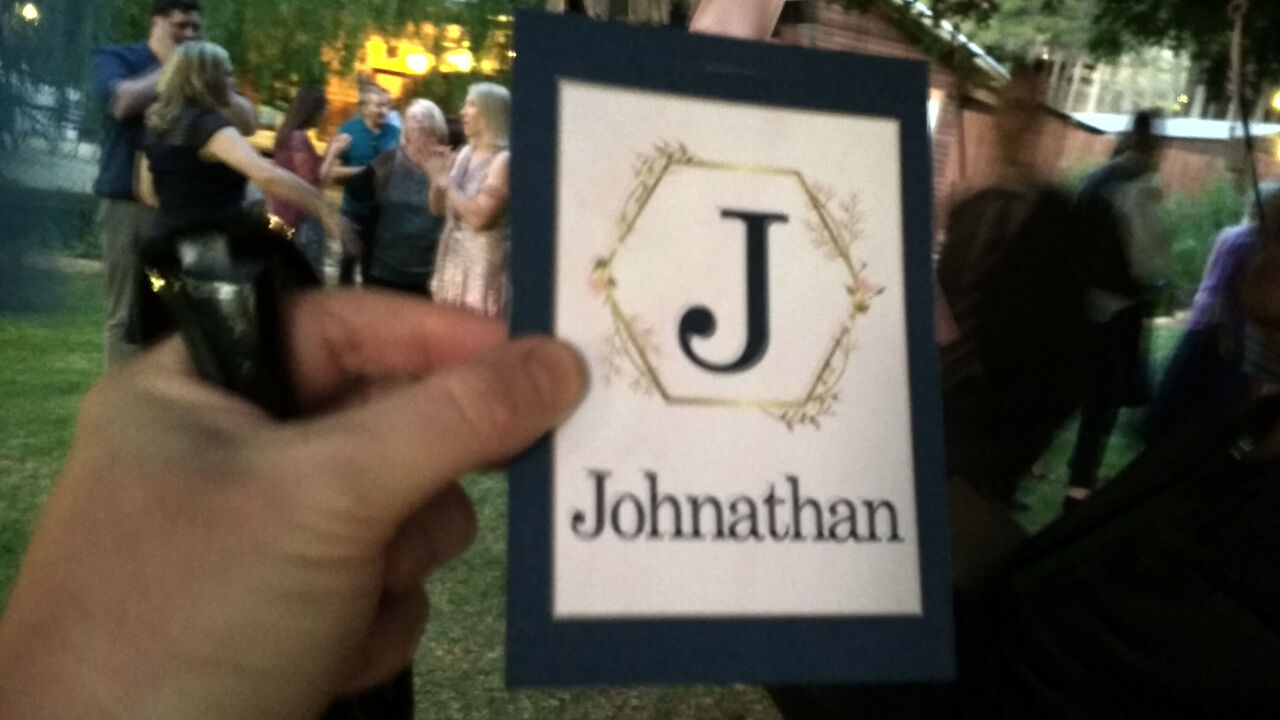 Except for one character being out of place, this was a perfect fairy tale wedding, but I pointed Wouter to
Except for one character being out of place, this was a perfect fairy tale wedding, but I pointed Wouter to  In a few days, I ll be attending
In a few days, I ll be attending  I have just released version 1.19 of Obnam, the backup program. See
the website at
I have just released version 1.19 of Obnam, the backup program. See
the website at  I will be speaking at the
I will be speaking at the 
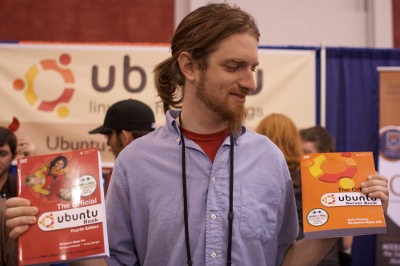 As I am attempting to focus on writing projects that are more scholarly
and academic on the one hand (i.e., work for
As I am attempting to focus on writing projects that are more scholarly
and academic on the one hand (i.e., work for  Reading Kyle's view on
Reading Kyle's view on  two words^W^Wone command.
# echo blacklist pcspkr >/etc/modprobe.d/blacklist-pcspkr
That is all.
two words^W^Wone command.
# echo blacklist pcspkr >/etc/modprobe.d/blacklist-pcspkr
That is all.

















